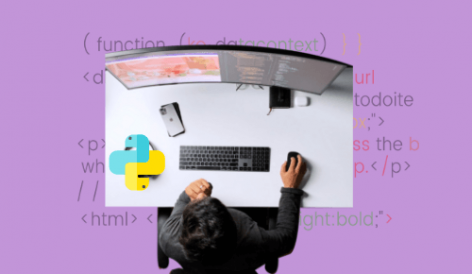Learn the basics of
Introduction to Python
Welcome to the Introduction to Python course. If you’re new to Python or programming and you’ve always wanted to learn basic software development skills, then this short course was designed for you. Python is an extremely popular programming language and rightfully so, it’s widely adopted among software developers and it is one of the easiest programming languages to get started with. Becoming proficient in Python can open an array of career opportunities for you in fields such as Data science, Artificial intelligence, robotics and software development. Throughout this course, you will learn the basics of the Python programming language, from variables to operators, conditionals and loops – we’ll cover it all.
Key Learning Objectives:
- Understand Python fundamentals
- Learn the basics of object-orientated programming
- Develop basic programs using the Python programming language
- Explore the various aspects of the Python language which can be extrapolated to various other languages

Ideal for:
Current leaders and managers, as well as potential and aspiring leaders and managers.
Course outcome:
Provide leadership and management teams with a thorough understanding of modern employment.
Course outline:
04
Weeks
01
Modules
08
Lessons
Course accreditation:
Upon completion of this team management course your employee will receive an accredited certificate assessed by global academic partners, Austin Peay State University and the CPD Certification Service.
Globally recognised by:

Course details
MODULE 1
Diploma in Introduction to Python
MODULE 1
Diploma in Introduction to Python
1.Introduction to Python
"In this lesson you will learn the basics of Python by exploring the programming language briefly. You will also install the required software to get your started for programming. "
2.Python variables
Variables are one of the foundation of programming. In this lesson you will learn why variables are so important and the various primitive data types often used when creating variables.
3.Understanding Python Operators
In this you will learn how to use Python operators to perform commonly used operations. This includes assignment, arithmetic, comparison and logic.
4. Using conditionals in Python
More often than not your program will require decision-making capabilities. In this lesson you will learn how to use control structures, such as the if… else… logic to perform specific operations based on a condition.
5.Working with Python functions
In this lesson you will learn the importance of code reusability by developing your very own Python functions to perform a specific task.
6.Understanding iteration with Python loops/h6>
Iteration is fundamental to programing when you need to perform a specific task over and over. In this lesson you will explore the different types of commonly used loops that are used to perform repetitive tasks.
7.Python Modules
The use of modules is a great way to package relatable functions that can be called in other script environments. In this lesson you will learn how to use existing built-in Python modules and you will also create your own.
8.Python lists and dictionaries
In this lesson you will learn how to store multiple data items in a single variable. This is an important aspect of object-orientated programming - objects often consist of layers and dimensions. You will learn the key differences between lists and dictionaries and how to interact with them as objects based on their native functions.